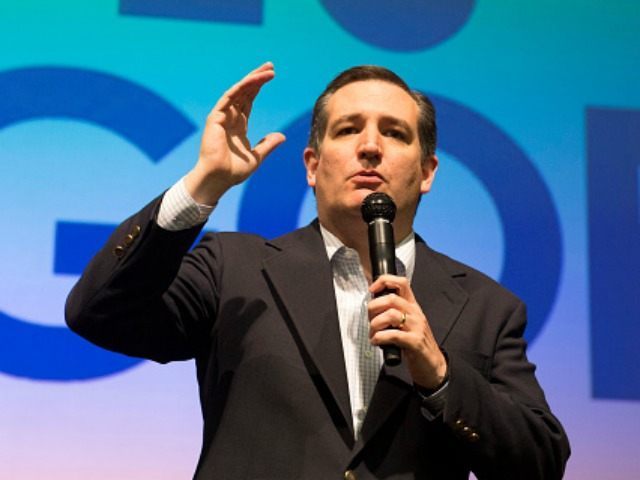For the first time in a very long time, the very late June primary in California will actually matter.
Moreover, thanks to the history of the California Republican Party, only Republicans can participate in the primary process in the nation’s largest state, and California has a winner-take-all-by-district system that may allow Sen. Ted Cruz (R-TX) to mount a comeback against frontrunner Donald Trump.
In 1998, Michael Schroeder was Chair of the State GOP. Schroeder was instrumental, as a member of the RNC’s Rules Committee, in securing language that was adopted into the official Rules of the party:
Any state Republican Party may set the date for any primary, caucus, convention or meeting for the purpose of voting for a presidential candidate and/or electing, selecting, allocating or binding delegates to the national convention. … To the extent a state Republican Party’s rules are in conflict with its state laws with respect to this rule, the provisions of this rule and the state Republican Party’s rules shall control.
Schroeder also successfully led an effort to amend the California GOP rules to make it clear that only Republicans can vote in the primary.
Today Schroeder is serving as the volunteer Political Director of the Ted Cruz campaign in California, where it could turn out that his handiwork of nearly 18 years ago may mean everything.
Also in 1998, then-State Senator Ray Haynes, a prominent California conservative, was lamenting the atrophy of GOP infrastructure in parts of the state from which Republican legislative representation was receding. Haynes worked with a member of his staff, Tom Hudson, to shift California’s delegate selection process to winner-take-all-by-district.
California’s old statewide winner-take-all-system had been in place since the 1970s, when Ronald Reagan’s political team put it in place to ensure he would win all of the state’s delegates heading into his 1976 RNC convention showdown with President Gerald Ford.
While Haynes and others tried to advance the change in 1998, the opposition of forces in California aligned with then-Texas Governor George W. Bush were able to exert political pressure to stop it – but not for long.
In the Spring of 1999, John McGraw was elected Chairman of the state GOP (and I was appointed CRP Executive Director). McGraw decided to champion Haynes’ proposal. A broad coalition within the party under the umbrella of the then-active California Conservative Coordinating Council built up broad support for a formal change in the rules.
The change to winner-take-all-by-district was actually adopted by the party’s 100-member Executive Committee in the summer of 1999, in a special meeting called by McGraw.
However, after its passage, the new language was found to be in conflict with existing state law, and while there was an avenue to litigate the difference, with a belief that the party rules would prevail, Senator Haynes decided that changing the law would be a smarter play.
However, by 1999, the Bush campaign was well enough underway that his allies in California were not in a hurry to see this new system implemented for the 2000 elections. They presumed Bush to be a prohibitive frontrunner, who would benefit from the existing statewide winner-take-all system.
An agreement was negotiated to pass an amendment to state law, which was done in the year 2000, and which allowed for state Republican Party rules to govern the process – in return for the change not taking effect until after the 2000 Presidential election cycle was over.
Thus the California GOP rules stand today, as amended 17 years ago:
Presidential Nominating Convention delegates shall be chosen by the Presidential candidate who obtained the plurality of Republican votes within each Congressional district, and, for Presidential Nominating Convention delegates and alternate Presidential Nominating Convention delegates “at large,” by the Presidential candidate who obtained the plurality of Republican votes statewide.
On Sunday, a Los Angeles Times/University of Southern California statewide poll was released showing that among likely June primary GOP voters, the race between Trump and Cruz is basically tied. That is a statewide average, however. The cross-tabs of the survey show that in various parts of the state, Cruz and Trump each enjoy an advantage. That could mean they will compete at the local level for delegates
Clearly, that means an intense focus on each Congressional district under the winner-take-all-by-district system now in place.. Which makes Haynes, a Cruz supporter today, very happy.
Hayes says of the upcoming fight, “By giving presidential candidates an incentive to develop that infrastructure in every congressional seat in the state — that is, the incentive of delegates — the California Republican Party will be strengthened.”
____________________________________________________________
Jon Fleischman is the Politics Editor of Breitbart California. A longtime participant, observer and chronicler of California politics, Jon is also the publisher at www.flashreport.org. His column appears bi-weekly on this page. You can reach Jon at jon@flashreport.org. Follow Jon on Twitter here.

COMMENTS
Please let us know if you're having issues with commenting.